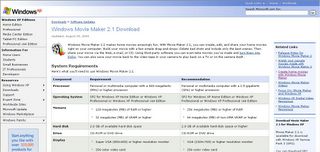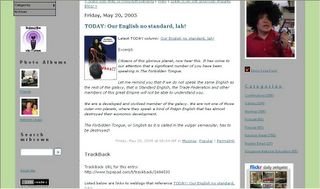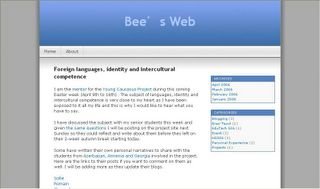This album is powered by
BubbleShare
- Add to my blog
Windows Movie Maker 2.1 Download
Windows Movie Maker 2.1 Download

 Click here.
Click here.
Write An Attention-Getting Resume
Write An Attention-Getting Resume


From CBS.com
click here
Sound Smart- tips from Interview Stream
Great examples from Interview Stream

 Click here
Click here
How to write a resume
How to write a resume


Click
here
Video Resume Links
Samples of Video Resumes


Creative video resumes, click
hereSimple but effective video resumes, click
hereSimple video resumes, click
hereHere's another one.
Short video embedded on a webpage, click
here Another example of embedded video resume, 'Kristen', click
here.
Lots of samples
here.
Impressive display of language skills,
Stephanie's video resume
The Forbidden Tongue, or Singlish
Citizens of this glorious planet, now hear this. It has come to our attention that a significant number of you have been speaking in The Forbidden Tongue.
Let me remind you that if we do not speak the same English as the rest of the galaxy, that is Standard English, the Trade Federation and other members of this great Empire will not be able to understand you.
We are a developed and civilised member of the galaxy. We are not one of those outer-rim planets, where they speak a kind of Pidgin English that has almost destroyed their economic development.
The Forbidden Tongue, or Singlish as it is called in the vulgar vernacular, has to be destroyed!
-------------------------------------------------------------------I personally feel that Singlish defines who we are as a nation... Singlish(Singapore English) and we should embrace it proudly. Gives us some sort of identity of being Singaporean although we haven't got an established nationalism. (A true embodiment of our creolised culture) But on the other hand, it is necessary that we should be able to distinguish the right/wrong times to speak it. Neither does it mean that we should be pardoned for not knowing the "true" forms of the language.
Speak correctly to an American/Australian/British to be understood. Speak Singlish to "kaki nang" to connect with each other, identify with each other.
Posted by: mermie | May 20, 2005 12:17:22 PM

 Link
Link
Topic prominent
Topic prominent
Singlish is topic-prominent, like Chinese. This means that Singlish sentences often begin with a topic (or a known reference of the conversation), followed by a comment (or new information). Compared to other varieties of English, the semantic relationship between topic and comment is not important; moreover, nouns, verbs, adverbs, and even entire subject-verb-object phrases can all serve as the topic:
Dis country weather very hot, one. �X In this country, the weather is very warm.
Dat person there cannot trust. �X That person over there is not trustworthy.
Tomorrow doh need bring camera. �X You don't need to bring a camera tomorrow.
He play soccer also very good one leh. �X He's very good at playing soccer too.


Speak Good English Movement 2005
Speak Good English Movement 2005!


Go to
Speak Good English link
Kahru's Outer Circle countries

Division of Groups
Groupings for Bee Dieu's Intercultural Communications project
Sofie- Jenny, Jennifer, Bernice, Phoebe, Cliona
Romaine- Stephanie, ERica, Alicia
Alexandre- Cindy Hsu, Ting, Aaron, Angela, Leo Kuo
Klara- Melody, Vera, Rebecca, Kimmy, Robin
Alberto- Sibyl,Hsiao-Wen, Carrie
Ellie- Julie, margaret, Linda, Cindy Huang, Ingrid
Camille- Jill, Carie Huang, Elsa, Winnie, Justin
Jeremy- Regis, Shonn, Wain, Jason, Leo Chien
Gregoire- Stella, Sam, Daniel
Amanda- Claire, Betsy, Jocelyn, Reggie
"I Has a Dream..."

"I Has a Dream..."
New York Times 09 October 1998 advertisement and followup
FAST-US-8 'Power, Pride & Politics in American English' Reference File
Department of Translation Studies, University of Tampere
The advertisement featured an image of a black man in a overcoat with his back turned to the reader, with the headline "I HAS A DREAM" written over the image of the man. Below the image was the following text:
"Does this bother you? It should. We've spent over 400 years fighting for the right to have a voice. Is this how we'll use it? More importantly, is this how we'll teach our children to use it? If we expect more of them, we must not throw our hands in the air and agree with those who say our children cannot be taught. By now, you've probably heard about Ebonics (aka black [sic] English). And if you think it's become a controversy because white America doesn't want us messing with their precious language, don't. White America couldn't care less what we do to segregate ourselves.
The fact is language is power. And we can't take that power away from our children with Ebonics. Would Dr. Martin Luther King, Malcolm X, and all the others who paid the price of obtaining our voice with the currency of their lives embrace this? If you haven't used your voice lately, consider this an invitation."
("SPEAK OUT AGAINST EBONICS", The National Head Start Association, 1651 Prince Street, Alexandria, VA 22314, The New York Times, October 9, 1998, A19 [National Edition])
Respect for dialects
Excerpts from "Everyone Has an Accent" by Walt Wolfram
A North Carolina professor advocates teaching respect for dialects
[1] Everyone notices dialects, and lots of people seem to be fascinated by them. But is it simply a matter of curiosity? What really lies beneath the laughter and the impetuous comments people make about how others speak?
[2]
The Dialect GameLinguists use the term dialect to denote patterns in the way people use language. These patterns include pronunciation (or "accent"), vocabulary and grammatical structures that reflect the user's cultural and regional background. Dialect is not limited to spoken language; users of American Sign Language employ variations that reflect their regional and social backgrounds as well.
[3] A moment's reflection exposes the level of judgment and prejudice about dialects and, by extension, their speakers. Consider the following recorded examples:
"They hear this Brooklyn accent, they think you grew up in the slum, hanging out on the corner."
"Wisconsin people, they're really bad, they sound like they're Norwegian."
"It's ignorant, it sounds ignorant, they gonna hear this and say, 'Look at them two beautiful girls; if they'd keep their mouth shut they'd be great.'"
-- from the video American Tongues
"What makes me feel that Blacks tend to be ignorant is that they fail to see that the word is spelled A-S-K, not A-X."
-- from "The Oprah Winfrey Show"
[4] The societal norm seems to be that attitudes about language differences don't even have to be disguised. Well-intentioned people who would be hesitant to make overt statements about race, gender or class openly mock and disparage language differences. In English with an Accent (see Resources), author Rosina Lippi-Green says that dialect discrimination is "so commonly accepted, so widely perceived as appropriate, that it must be seen as the last back door to discrimination. And the door stands wide open."
[5] Truth and Fiction About Dialects
There is a popular belief that dialects are simply corruptions of "real" or "good" English that reflect basic ignorance of well-known grammar rules. But the truth is that dialect structures are in themselves quite natural and neutral. Their social impact comes solely from their association with different groups in our society. If people belong to a socially oppressed group, they can count on having their language stigmatized; if they belong to a prestigious group, their language will carry prestige value.
[6] Contrary to the common belief that standards of language are fixed forever, they respond, like any other aspect of culture, to the dynamics of social change.
[7] Variation in speech is at the core of social and historical identity, interwoven into the fabric of cultural differences.
[8] The misinformation and misunderstanding about dialects in our society is not simply a matter of innocent folklore. People's intelligence, capability and character are often judged on the basis of a sentence, a few phrases or even a single word. Studies show that children as young as 3 to 5 years of age show strong preferences -- and prejudices -- based on dialect variations among speakers. Teachers sometimes classify students' speech as "deficient" when it is simply different from the testing norm. In the workplace, perfectly capable workers who speak non-mainstream dialects may be denied occupational opportunity because they "just don't sound right for the job."
[9]
What's the Solution?
For over a decade now, a small group of linguists and educators have been piloting programs specifically designed to instruct students about dialect. The goal of these "dialect awareness" programs is straightforward: to provide accurate information about the nature of dialect differences and promote understanding of the role of dialects in American society.
[10] Learning about dialects is hardly at odds with the acquisition of standard English grammar. In fact, part of the education process involves mastering appropriate styles of speech for different occasions, including those situations where standard English is required. At the same time, growing evidence supports the conclusion that respect for and knowledge of a student's community dialect aids rather than hinders the acquisition of standard English.
Click
here to read full article. It's a good read.
Ebonics: How detrimental is it?
McLean, Va.: What about "Ebonics" -- do you think it's detrimental to a large part of our society?
Robert MacNeil: Ebonics is another word for what linguists call the African American Vernacular English, a dialect of English. The controversy over Ebonics arose when the Oakland, Calif. school system claimed that it was a different language and therefore qualified for federal funds to finance the teaching of ESL, English as a Second Language. The furor that arose greatly confused the issue, which remains important in American schools, and an obstacle to children from the inner cities who have more trouble learning to read and a higher dropout rate than other American children. In our TV series and book
we explore an experiment in Los Angeles schools to teach 5th graders the difference between their home speech and mainstream American English. Steve Harvey, a popular radio host in LA and an African American, says that
to get on in this country "you need to be bilingual." Unfortunately many teachers,
black and white, so look down on "street talk" that it prejudices them against the children, whom they sometimes treat as uneducable.
The LA experiment is an effort to treat the black dialect more sympathetically and without racist putdowns to bring the children along into standard English. _______________________
Fairfax, Va.: I heard what you said yesterday on NPR re: Black English and agree completely. I wish we'd stop maligning it and study it seriously as a dialect the way we do other regional or ethnic dialects. I think it's a subtle form of racism. We did the same thing with jazz, thinking it primitive, and now know it is one of the most sophisticated music forms out there.
Robert MacNeil: Right on!
I would like to thank you all, y'all, youns, yinz for your interesting questions and I will leave you with what is fast becoming the universal American form of address, so thanks you guys.
*Text lifted from Washingtonpost.com, click
here to read the full article.
Black English in Literature

BE is increasingly being encountered in literature, televised and filmed drama, etc., as 'authentic' speech of Black American history
Alice Walker in Color Purple
From The Color Purple, by Alice Walker [1982] (p. 3)
Dear God,
My mama dead. She die screaming and cussing. She scream at me. She cuss at me. I'm big. I can't move fast enough. By time I git back from the well, the water be warm. By time I git the tray ready the food be cold. By time I git all the children ready for school it be dinner time. He don't say nothing. He set there by the bed holding her hand and cryin, talking bout don't leave me, don't go.
She ast me bout the first one. Whose it is? I say God's. I don't know no other man or what else to say. When I start to hurt and then my stomach start moving and then that little baby come out my pussy chewing on it fist you could have knock me over with a feather.
Don't nobody come see us.
She got sicker and sicker.
Finally she ask Where it is?
I say God took it.
He took it. He took it while I was sleeping. Kilt it out there in the woods.
Kill this one too, if he can.
Audio samples of Ebonics

Kanye West (WMV) during the Katrina relief program,
click here to watch the clip
A general white skepticism toward BE (see Howard Stern's 'Ebonics' Interview [MP3] with D.H. Hughley,
click here to listenDownload
mp3 file.
Bee's Personal Narrative

To download the file,
right click (hover your mouse to this link) here. And click 'Save file as'. After downloading the file, you could transfer it to your mp3 player and listen to it while you're on the go!
Start sharing your ideas!
Read what other foreign students think about this issue, "Foreign languages, identity and intercultural competence". Bilingualism is an issue that we covered in class. On our discussion forum many of you have admitted having a public and private language- a question that Bee asked her students to think about. We also touched on 'identity' and how language affects the way we view ourselves and how we look at others. There is power in language- just as Barbara Mellix expressed in her article. However, that power is associated with being proficient in a language, being confident with it and using it to gain a certain status in society. This is what makes it a bit difficult for EFL (English as a foreign language) students. High level of proficiency is not easy to attain. It takes a lot of practice, a lot of effort, and sometimes it may even take a lifetime. But having gone through with all the hardships in learning English, you have all come a long way.
Let's take a look at what some of Bee's students have to say:
From Amanda
In my country, English is the first language people use to communicate with foreigners. English is widely spoken in much of the world. I really don' t think that just by learning a different language we change our identity, but we assimilate the languages and they become part of our identity. We can maintain our own customs and way of life, and at the same time speak many languages. In my case, I continue to live as a Brazilian. However, I have adopted certain French customs as my own - but this didn’t' t change who I am.
Finally, learning different languages is very important and also needed at this time of our lives as learning another language can help you to understand your own.Tell Amanda what you think,
visit her blog and click on 'Comments' to leave her a message.
See what other students have to say. Here's
a link to Bee's students' individual blogs.


Share to the world what you know...
To my Language and Culture students,
Here's a message from Barbara Dieu, a teacher from Brazil:
Hi Aiden,
This week I am mentoring the group of students of the Young Women
Caucasus Project I told you about. I have included links to your blog in the
project blog as well, and would like to invite your students to comment
on the post there
http://ycwmentor.neweurasia.net/?p=47
or on my students惑logs.
https://bdieu.wordpress.com/2006/04/07/foreign-languages-identity-and-intercultural-competence/
Warm regards from Brazil,
Bee-------------------------
This is the international collaboration activity with other students that I was talking about in class (yesterday). I think that it is a good opportunity for you to get in touch with other students from different countries and learn more about their cultures while at the same time you gain new friends. If you read Bee's full message at this link
http://ycwmentor.neweurasia.net/?p=47 you'll see at the bottom of the page a box for leaving comments/response. You could write a message to Bee or you could post your opinion about the questions that she asked.
You could even visit her students' individual blogs. To do that,
click this link.Your contribution to this project is deeply appreciated.
Aiden


Standard American
The "unaccented" variety that is sometimes called Standard American or Standard Speech is one taught by accent coaches. This form is actually an idealized dialect - meaning, it's not really spoken anywhere, but instead is acquired through professional training. Actors and professional communicators (including some from the Midlands!) often take classes in "accent reduction" to lose any regional or social sounds in their speech. It takes a lot of work.

 http://www.pbs.org/speak/seatosea/standardamerican/
http://www.pbs.org/speak/seatosea/standardamerican/
Ebony + Phonics
Dr. Robert Williams, an African-American social psychologist, coined the term Ebonics in 1973. His goal was to combine the words “ebony” with “phonics” to refer to “black sounds.”Williams and several other African-American social scientists had gathered that year at a conference sponsored by the National Institutes of Health to discuss the psychological development of black children. Williams and his associates had been displeased with the term Black English and began to ponder the alternatives.

 http://www.pbs.org/speak/seatosea/americanvarieties/AAVE/ebonics/
http://www.pbs.org/speak/seatosea/americanvarieties/AAVE/ebonics/
Ebonics Emerges
Ebonics Emerges
African-American Vernacular English (AAVE) — sometimes known as Black English or Ebonics — is used by many African Americans, particularly those from working-class or inner-city areas. Black English clearly differs from other varieties of English in its vocabulary, grammar and pronunciation, but simply attaching it to one population group oversimplifies a complex situation.
Many African Americans do not speak Black English; many non-African Americans who live in inner cities do. Complicating matters further, African American influence — music, fashion, language — on American culture is very strong. As a result, some white American teenagers from the suburbs consciously imitate Black language features, to express their own group identity and shared opposition to mainstream culture.
Many people — African American or not — look down on Black English as an undesirable or ignorant form of the language. Others see it as a proud and positive symbol of the African-American experience. A few political activists or Afro-centrists insist that Ebonics isn’t a dialect of English at all but rather a separate language with roots in Africa. And many people accept Black English as an important social dialect but argue that its speakers must also master standard English in order to succeed in America today.
The debate illustrates a larger sociolinguistic point. We all master several different varieties of our language, standard and less so, that we deploy depending upon social contexts. In unfamiliar social situations, we feel linguistically inadequate and “don’t know the right thing to say.” Yet we can pick up the lingo of a new context if we are exposed to it long enough.
[The text above is lifted from PBS, Do you speak American, Language & Society,
http://www.pbs.org/speak/words/sezwho/socialsetting/
Barbar Mellix

Outside, In
by Barbara Mellix
Documentary Film Rubric
A rubric has been created to help me assess your documentary film project.
Download the rubric (hover mouse to the url link below, right click mouse and select, 'Save as')
To view online, simply click the url below.
View/download Rubric40-44 points= A
35-39 points= A-
30-34 points= B+
25-29 points= B
20-24 points= B-
15-19 points= C
10-14 points= C-
5-9 points= D
1-4 points= F
A= 95-100%
A-= 90-94%
B+= 85-89%
B= 80-84%
B-=75-79%
C= 70-74%
C-= 65-69%
D= 60-64%
F= 59 below
Taiwanese Language and Identity

A documentary film on Taiwanese Language and Identity. A general discussion on its history and current situation is addressed in this film.
Watch it if you have time. It would be great if you tell us what you think of the film and the ideas that this group of students presented.
Download the film here. WMV, 16 minutes.
Right click the link, select 'Save as..'
Taiwanese Immersion Program

Watch this documentary film produced by Group 3 in partial fulfillment for Language and Culture class. The theme of this class project is 'Dying Languages'.
Group 3 looks into that issues surrounding the Taiwanese government's effort to teach 'Taiwanese' to Elementary school students. The film provides a historical background but mainly focuses on the issues concerning the effectiveness of the program.
Watch the short film and tell us what you think.
Download the film (in MP4 file), click
here. Right click the link, and select 'Save as..'
Read the
report here.
Hakka

The theme of the class project is 'Dying Languages'.
The documentary film is an original production created by Group 7 in partial fulfillment for Language and Culture class.
Film: 19 minutes
Streaming the film online takes a long time, downloading it to your hard drive is better and faster. To download the file, right click your mouse. Select 'Save as..'
Download WMV file, click
here.
Download
MP4 file (you can also transfer this file to your Ipod Video or any mp3 player that plays video).
Please tell us what you think of this documentary. To leave a message, click 'Comments'.
Thanks.






















